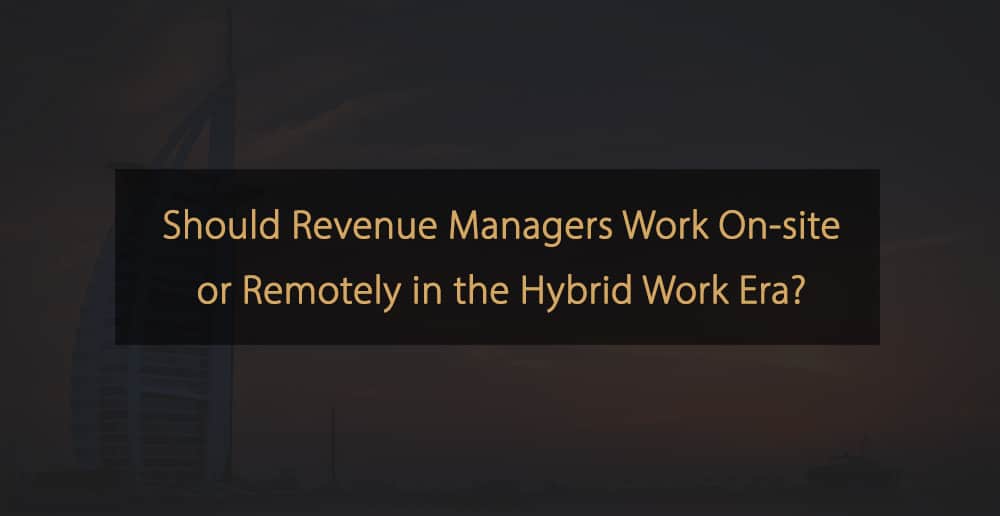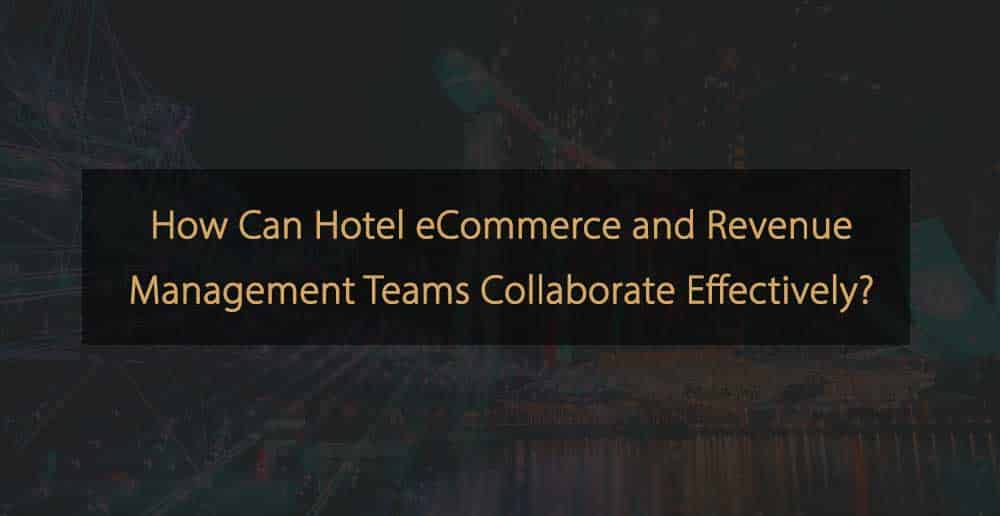Question for Our Revenue Management Expert Panel:
How Does the Onboarding Process of Revenue Management Teams Differ According to Level? Which Topics Should Be Emphasized for Each Level? (Question by Daniel Feitosa)
Industry Expert Panel
Our Industry Expert Panel exists out of professionals within the hospitality & travel Industry. They have comprehensive and detailed knowledge, experience in practice or management and are forward-thinking. They are answering questions about the state of the industry. They share their insights on topics like revenue management, marketing, operations, technology and discuss the latest trends.
Our Revenue Management Expert Panel
- Heiko Rieder – Vice President Business Development, Hirmer Hospitality and Travel Charme Hotels
- Alenka McMahon – Managing Director, HOTEL REVENUE SERVICES LIMITED
- Patrick Wimble – Founder & Managing Director, Lightbulb Consulting
- Pablo Torres – Director, TEDUKA & Hospitality Consultant, Torres Hospitality Consulting
- Dermot Herlihy – Commercial Director, DUKES LONDON
- Mariska van Heemskerk – Owner, Revenue Management Works
- Diego Fernández Pérez De Ponga – Director of Revenue Management, Palladium Hotel Group
- Fabian Bartnick – Founder, Infinito & Co-Founder, PerfectCheck
- Massimiliano Terzulli – Revenue Management Consultant, Franco Grasso Revenue Team
- Damiano Zennaro – Founder, DZ Consulting
- Ask Our Panel a Question
- Join Our Expert Panel
“Naturally, this depends very much on several factors. Such as the size of the organization, the available tech-stack, the business mix, and geographic impact. A single property or cluster revenue manager has to get familiarized with the micro market, competitors, demand generators for the region, and the historic business mix. Site inspections and interviews with competitors are indispensable.
Depending on available technology it will also be important for him or her to understand all details about the setup of rate codes, how to set restrictions, and change rates. Lastly, it might be necessary to provide professional training in BI and reporting tools so he or she knows how to pull the data required for the analysis. There should also be a large emphasis on getting to know the hotel team and learning about their wishes and pain points. This is especially important for Revenue Managers not based on property.
Regional Revenue Directors managing teams of Revenue Managers can be less skilled in managing rates and inventory in the systems as they don’t require this for their daily routine. But they should understand the impact it has on their teams in order to measure their efficiency. The stronger focus during onboarding will lie on BI and reporting capabilities and the structural setup of the team.”
“Revenue Manager – looking after well known property with positions in the same place.
Cluster Revenue Manager – capable of multitasking and understanding the differences for each property (product, customers, market, sale strategy, etc.)
Director Revenue Manager – can’t be the sort of person who “doesn’t see the forest for the trees”, must be a capable leader, able to delegate, and goal-oriented (avoiding short-term success).”
“Overall, the onboarding process for revenue management teams should emphasize a mix of technical skills, communication skills, and strategic thinking. With all traits tailored to the specific level of the role. They should also focus on laying the foundation to form the great working relationships they’ll need to be successful within it.
For a Revenue Manager it should initially focus on learning about systems and tools they’ll be using to manage inventory and pricing. It should also focus on understanding the current pricing strategies, learning the competitive landscape, and filling any gaps in knowledge identified at the interview. It should also help them understand how their role fits into the broader hotel or company strategy.
The assumption here is that any Cluster Revenue Manager you hire has the required revenue management experience. If they are a first-time cluster manager, onboarding should focus on how they’ll step up – not getting bogged down in the day-to-day running of individual hotels and managing their time effectively. Onboarding for this role should include an emphasis on communication skills and collaboration, as they will need to work closely with multiple teams. They should also learn how to analyze data across multiple properties to identify trends and opportunities for optimization.
If the Directors of Revenue Management here are for multiple units, it is likely they would be responsible for developing and implementing revenue management strategies across the entire organization. Again, if this is their first time in a role of this size, onboarding should include a focus on leadership skills and the ability to communicate effectively with senior executives and other stakeholders like owners, etc. It should also help them understand the complexities of all their stakeholders. The focus should be getting out and meeting all these stakeholders, the wider team, etc. They should rapidly develop a view of the strengths and challenges they’ll face.
In all the above, having a mentor will help them settle in and get up to speed. A small investment of time, but a big payoff in effectiveness!“
“The technical info and knowledge should be similar. But the higher one goes, the more focus needs to be placed on both strategy (thinking long term) and team leadership. For someone who has a team, a good percentage of time should be dedicated to nurturing it. Lead the team, and inspire them, as they’ll be the ones doing the thick of the work on a daily basis. And for that reason, keeping them engaged and motivated is key.”
“This is a really great question and it’s one that’s always been a big part of how I’ve recruited these roles or advised on their introduction into a property or group. At the interview stage, ask what the individual would do in the first three weeks.
Before fully onboarding, if the position is new to the property or group, the rest of the team needs to understand what the function of this individual will be. This will bring a forensic revenue development with them. They need to open their minds to opportunities that will benefit the entire team.
My background involves operating within stand-alone and small groups, within primary roles of RM or Cluster RM. And I have taken the same approach with both roles. Full property immersion is needed in order to understand revenue opportunities and locate areas with potential bottlenecks.
Understanding the tech-stack comes next. It’s important to let them see what they have to work with. This brings up questions of whether the stack needs updating, whether it be updated, what needs to be implemented, or what has further maximization opportunities. It all comes with budget, forecasting, and getting into the details. In conjunction with the S&M team, FC and the GM, to see the current revenue impact and where it can go.
At the end of the day, it’s a role where the individual can write their own onboarding process with the GM to set a clear tone of revenue maximization right from the start.”
“At the lowest level, people should be trained on the job in a task-driven manner. And as we move our way up in positions, the time management will shift as well. This will encompass strategy, stakeholder management, knowledge of the marketplace, etc. In the end, the Director of Revenue should also be aware of all details relating to the job in order to pinpoint possible improvements. But their first and foremost focus should be examination of the results or lack of results. From there they can focus on stakeholder management. Whereas a single hotel revenue manager will dive into daily tasks right away and needs to be on top of it as soon as possible.”
“In my view, I believe that the onboarding process should be consistent across all levels. But let me elaborate on this point. Besides the technical aspects, it’s also crucial to onboard the culture of our company. Therefore, we need to prioritize this aspect. While the technical onboarding for a Junior Revenue Manager may differ significantly from that of a Senior Manager or Director, the cultural onboarding remains the same at all levels. It is a common misconception that senior positions do not require an extensive onboarding process. But this is a significant mistake.”
“The onboarding process for revenue management teams should be tailored to the position level. Technical skills and processes will be emphasized at the lower levels, while strategic thinking and leadership skills will be the focus at higher levels. The ultimate goal is to help each team member develop the skills they need to drive revenue growth and succeed in their role. We actually created a school for this for the entry and mid-level. A simple, all you need to know course, for revenue managers. In their own time, in 5min chunks.”
“Tasks may vary depending on the size of the property and its hierarchical organization. However, the boundaries are often blurred. The figure of the Director of Revenue Management is often found in large chains. And this individual will have fewer operational tasks in the daily decision and distribution of prices and inventory on online channels.
Their role is more of a long-term strategic and financial one. His or her goal is to oversee the overall profitability trend of the company. And the same applies to the various hotels if it’s a chain. The individual is then directly responsible for forecasting and budgeting, reporting to the General Manager, and overseeing the reservations, revenue, and e-commerce team. They have more decision-making power than a revenue manager in implementing tools that can help performance.
Their focus could be more focused on the analysis of profitability KPIs and how a tool can provide the right data to improve the strategy. While the revenue manager, being more operational, could be more attentive to how the tool optimizes data collection and pricing distribution. This would likewise point to workload and time savings. Even more so if it is a group of hotels. The cluster revenue manager, having to manage many properties at the same time, will be much more attentive to automation. It can be an indispensable element to improve their work and be more efficient in the elements of strategy and distribution.”
“The onboarding process is a fundamental step in staff success and engagement. Regardless of the level and the position a great onboarding process should take a few common elements into consideration: Clarity on expectations, a good company overview, insight on the “why’s”, the “what’s” and the “how’s” in regards to the vision and mission of the company, and challenges the new team member will face.
In my professional life, I’ve experienced amazing and terrible onboarding; a great onboarding motivates people and lets them feel like a part of a team from the very beginning. Technology can no longer be ignored in today’s environment. So more strategic and soft skills are required from a revenue manager regardless of the position or the level he or she will cover.
In addition to strong analytical and technical knowledge, emphasis should be placed on impact and influence skills. Skills based on data-driven reasoning, communication skills used to convey complex challenges in simple terms, strong presentational skills (upwards to C-level and downwards to staff depending on the role), the capability of embracing changes, and a dose of courage.
Depending on the role, with or without direct reports, leadership skills are fundamental. True leaders naturally influence people. And the bigger the team the more time has to be spent in inspiring people and building a trusted working environment. People make a difference and I’ll never forget something a great leader told me in the past: Choose your boss not your job.”
Ask a Question & Join Our Expert Panel
Would you like a question to be answered by our Industry Expert Panel? Or would you like to join our community of experts and share your experience, insights, and knowledge with fellow industry professionals? Via the buttons below you can submit a question or submit a request to become part of our expert panel.
More Tips to Grow Your Business
Revfine.com is the leading knowledge platform for the hospitality and travel industry. Professionals use our insights, strategies, and actionable tips to get inspired, optimize revenue, innovate processes, and improve customer experience.Explore expert advice on management, marketing, revenue management, operations, software, and technology in our dedicated Hotel, Hospitality, and Travel & Tourism categories.

















Leave A Comment